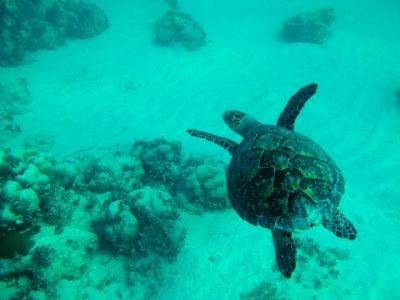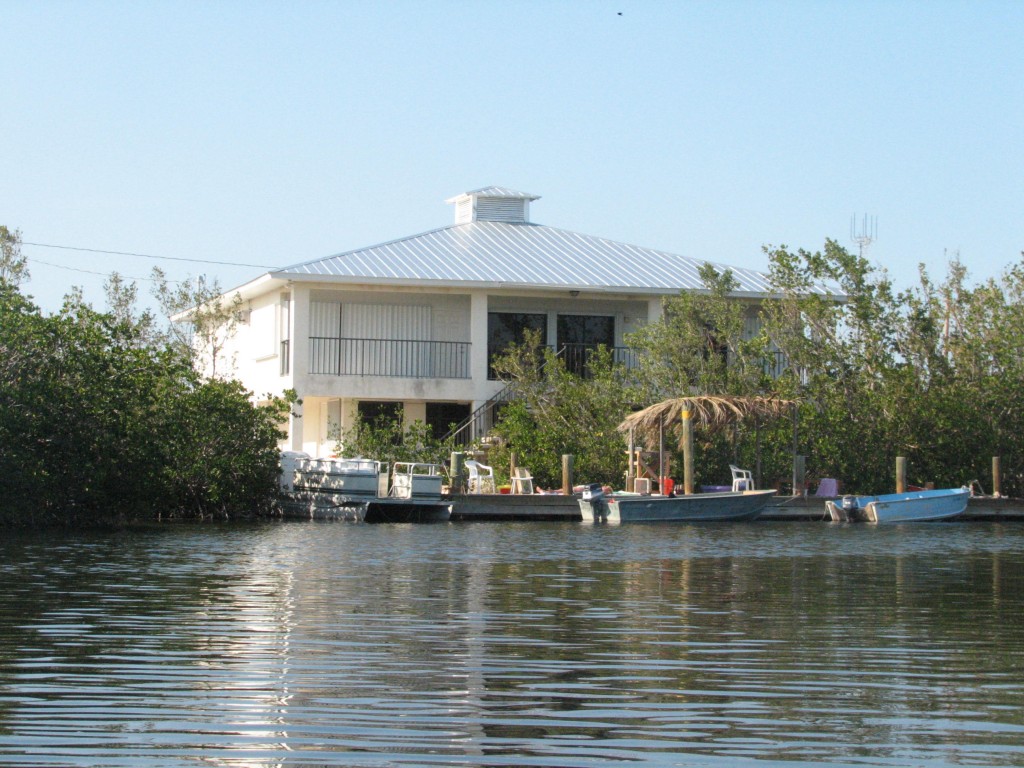J.N. Roth Marine Biology Station
History
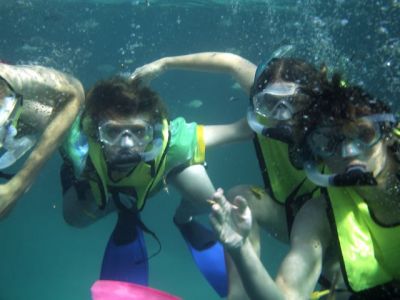
The Marine Biology Program has been a part of the Goshen College Biology Department since 1966, when Drs. Jonathan N. Roth and C. Franklin Bishop accompanied a small group of students to Pigeon Key during spring vacation. After three years the program moved to more suitable facilities on Big Pine Key.
When a Goshen College faculty member who had retired in Layton (Long Key) prevailed on the Goshen group to drive 30 miles to sing in the Layton Community Baptist Church, church deacon Del Layton, mayor of the town of Layton, took great interest in the Goshen College program. At his invitation the program moved to Layton. Marine biology laboratory sessions the first year were held in the Layton town hall; in subsequent years in a laboratory building erected in association with Lime Tree Bay Resort. Later, a group headed by Layton donated a parcel of land for the purpose of building a marine biology laboratory. In 1985 GC responded to Layton’s generosity by erecting the current building.
In recognition of the instrumental role that John N. Roth and C. Frank Bishop played in establishing the marine program, in 2009 President James Brenneman officially named the facility the J.N. Roth Marine Biology Station and the laboratory the C.F. Bishop Marine Biology Laboratory.
Dr. Duane Kauffmann wrote a history of the marine biology program entitled: Willamette Valley to Long Key: The Story of the Goshen College Marine Biology Program. We invite you to enjoy this history by downloading a copy of the booklet here.
Courses & Activities
Goshen College students have numerous opportunities to study Marine Biology in the Florida Keys, including participation in an annual course, marine ecology research projects, and the Marine Biology Internship Program.
BIOL 304 Marine Biology
Students at Goshen College gain an in depth exposure to marine systems through taking BIOL 304 Marine Biology taught for 3 weeks during May-term. This class has been operating for more than 50 years, and are often cited as a highlight of students’ academic experience at Goshen.
The course is an intensive exposure to marine systems which highlights: a) the important theoretical ways marine systems are structured differently that terrestrial systems, b) the taxonomic diversity of life found in various marine habitats, and c) the process of designing and implementing ecological research in marine systems.
Recent student projects include:
- Habitat preference of L. variegatus in response to density change of Thalassia testudinum and macroinvertebrates – Josh Delp, Anne Pierre, David Stoesz, & Mara Swartzentruber
- The effects of boat scars on seagrass habitat in the Florida Keys – Nate Day, Jing Jin, & Julian Sider
- Factors that influence selection of marine sponges as refuges – Ben Baumgartner, David Graber, Robert Lerch, and Melissa Zehr
- Determining the significance of variables that affect biodiversity among Rhizophora mangle island systems – Chelsea Frederick, Caleb Hochstetler, & Jacob Nofziger
Marine Biology Semester
Immerse yourself in research and study in a Florida Keys marine biology station for a semester. Beginning in 2019, the college offers a new Marine Biology Semester in the Florida Keys. During this semester-long residential program, Goshen College environmental and marine science majors with a marine biology track take 2 courses, complete an internship with a local marine organization and design their own research project — all the while living at the college’s unique J.N. Roth Marine Biology Station in the culturally rich and diverse Layton, Florida. The Marine Biology Semester is offered annually in the fall semester for 12 weeks, beginning in late September and going through early December.
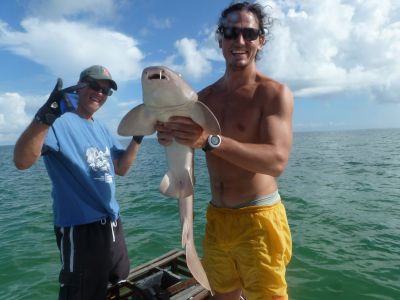
Marine Biology Internship recipients:
2019 – Emily Brandeberry & Max Burkholder
2018 – Keila Flores & Josh Liechty
2017 – Cody McCoy & Reena Ramos
2016 – Morgan Short & Ben Wiebe
2015 – Kate Vendrely
2014 – Caleb Longenecker & Aaron Stiffney
2013 – Barrett Donna & Avery Bischoff
2012 – Mike Zehr & Aaron Kauffmann
2011 – Zachary Clouse & Kurt Neufeld
2010 – Nathaniel Tann
2009 – Camry Hess & Nate Burmester
Photos from recent GC May term Marine Biology classes:
Research & Collaborations
The Goshen College Marine Biology program continues to grow as a result of the collaborative work from numerous faculty from various institutions. Based on their long-term commitment to marine science and their outstanding contributions to the Goshen College program, the following individuals and their institutions have developed a formalized Memorandum of Understandings (MOU) with Goshen College and thereby serve as members of the J.N. Roth Marine Biology Advisory Council.
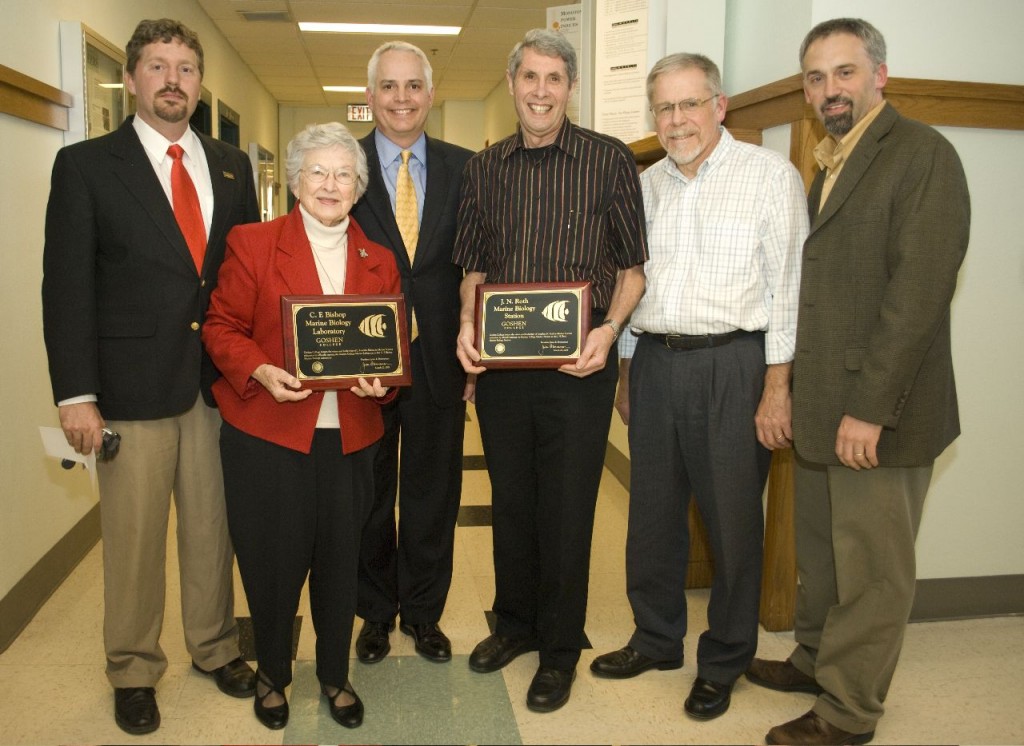
Marine Biology Advisory Council
Carl Weaver Goshen High School
Carl Weaver graduated from Goshen College in 1969 and currently teaches Biology at Goshen High School where he has developed a strong Marine Biology program that is in its 40th year. Carl and his colleagues from Goshen High School have been ardent supporters of the GC Marine Biology program and have helped improve the facility through annual work-trips to complete various renovations. Goshen High School uses the J.N. Roth facility every April for their student trips.
Von Schrock Central Christian High School
Central Christian High School (Ohio) brings a group of high school students to the J.N. Roth Marine Biology center each spring under the leadership of Von Schrock. Von teaches Biology, Chemistry, and Environmental Science at Central Christian and graduated from Goshen College (class of 1988) having studied Biology under the mentorship of Dr. Jonathan Roth, retired professor of Biology and founder of the Marine Biology program at GC.
Dr. Duane Kauffmann, Professor Emeritus, Goshen College
The Marine Biology program has benefited greatly from Dr. Kauffmann’s assistance in teaching, research, and program development for more than 30 years. Duane, retired professor of Pscyhology, has developed a number of pictorial identification keys for use by Goshen College Marine Biology students. Several of these keys are now available for use by others who might find them of help in their taxonomic work with the plants and animals found in the shallow waters of the Florida Keys. Comments, questions, and/or corrections to these materials may be directed to Dr. Kauffmann at Goshen College (duanerk@goshen.edu).
- Key to the Snails of the Middle Florida Keys
- Key to the Red Algae
- Key to the Brown Algae
- Key to the Green Algae
Dr. Anthony Swinehart Hillsdale College
Dr. Swinehart graduated from Goshen College in 1992 and currently teaches Biology at Hillsdale College. He has been bringing Hillsdale students to the J.N. Roth Marine Biology station for more than 10 years and got his start in Marine Biology under the mentorship of Dr. Jonathan Roth, after which the facility was named. Dr. Swinehart has research interests in paleoecology and aquatic ecology and has contributed to the marine program in many ways including: donation of specimens, renovation and maintenance of the facility, and long-term monitoring of Zane Grey Creek.
Use of J.N. Roth Marine Station
Goshen College owns and operates the J.N. Roth Marine Biology station to provide high quality research and educational opportunities in marine science for students, teachers, and researchers.
With the long-term intention of contributing to the preservation and restoration of the ecological integrity of the Florida Keys, we welcome your group to make use of our facility.
If you or your institution has interest in research at the facility, questions can be directed to Cynthia Good Kaufmann – Director of Planning and Events – events@goshen.edu.
Frequently asked questions:
Who can use the facility?
As an educational facility, the J.N. Roth Marine Biology Station is open for use by school groups – high school through graduate – or university researchers.
Is the facility available for Goshen College employees to use?
When available, the facility is available for Goshen College employees (and their families) at a reduced rate for rest and relaxation. Contact Ryan Sensenig for more information.
How many persons can the facility accommodate?
Due to zoning changes, we are now likely going to be limited to 10-11 person limits, but further updates will be provided. Accommodations include two wings, each with a separate bedroom, bathroom, and kitchen. A dining area and living room are common areas.
Where is the facility located?
Our station is in the City of Layton, located at Mile Marker 68.5 along the Overseas Highway on Long Key in Monroe County, Florida.
What equipment and lab space is available?
The station has its own private dock on Zane Grey Creek which allows access to the ocean. Guests are welcome to use our two person kayak, collection buckets, and taxonomic keys located in the C. Franklin Bishop Laboratory beneath the living quarters. There is ample bench space and tables/chairs for lectures and presentations. We do not rent boats.





